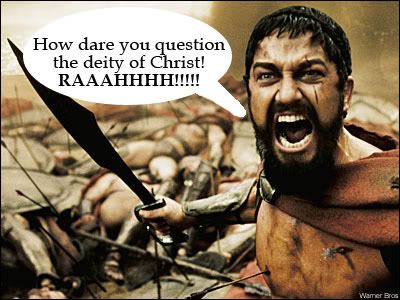
"Well, you cant just cut out the parts of the Bible you dont like"
As i've begun to have not-so-traditional interpretations of the Bible and Christianity, Ive heard this phrase more and more. The ironic thing always being that I never recall asking that we "cut out" any part of scripture to begin with. Of course what people usually mean by this is that we should make sure not to just ignore certain parts of the Bible, and instead interpret each verse/passage with the whole of scripture in mind. And while I agree with that idea, I contend that doing so does not magically lead you to one unassailable Biblical perspective...as those who use this phrase seem to think.
The first reason for this, is simply that every person who reads the Bible comes to it with prior assumptions. These may come from a sermon you heard last week, something your parents told you when you were young, a book you read by Joel Olsteen, or dare I say that which you desire to be true or false. All these things and more help create the lens by which we view and read the Bible(or really anything else in life). In some cases it helps us connect ideas and events in a way that aids our understanding. A simple a connection I remember making at a young age was from the story in Genesis 22; where God tells Abraham to sacrifice his only son, but at the altar provides Abraham with a ram to sacrifice instead. I quickly saw that story as a foretaste of Christ's future atonement , that I probably wouldnt have seen had I not been already familiar with the Gospels.
However in other cases, our presumptions hinder us from seeing things that otherwise would maybe be more apparent. This is because some of our presumptions are very "set in stone"(or what I call core beliefs). If one is to define something as a core, unmovable belief, then any passage or verse that seems in opposition to that, is systematically going to be interpreted around that core belief. One of the typical core beliefs of a Christian, for example, is the deity of Christ. So when they read a verse like, Ephesians 1:2 where Paul says, "Grace to you and peace from God our Father, and the Lord Jesus Christ."
Its not likely they are going to assume that Paul means that Jesus isnt God, even though Paul references God and Jesus here almost as if they are two separate beings entirely. Rather, one might say, Paul's simply refering to Jesus and the Father in a "trinitarian" sense (Thats not the greatest example, but you get the idea). Now, with that said, many peoples core beliefs do change on occasion. But it happens more slowly and a lot less often than our perspectives on more "minor" biblical issues(such as baby baptisms and the rapture). Core beliefs are usually so deeply hardwired into our hearts and minds, that to modify them requires a major reassessment of our world and biblical view. So even in the face of considerable evidence it is only natural that we fight for these ideas tooth and nail...even to our "theological death" so to speak.
Our presuppositions on the Bible are also developed through our readings of other parts of the Bible. Each interpretation we make about a particular verse/passage will in some way affect how we see another verse/passage...be that in the same chapter or 8 books later. One particular conflict that is solved in such a way, is in regards to Jesus being the savior of "all men" and the existence of an "eternal" Hell. Both are concepts founded on several verses, but at face value we logically cant believe both ideas. Jesus cannot save all mankind and yet, some be lost eternally to Hell...its a contradiction, so we have to make some interpretations here. We may interpret that Jesus is the savior of all, but only in the sense that He can potentially save all, thus allowing for the existence of a never ending Hell for some. Or we may interpret that the Hell texts do not speak of a literally unending punishment and that any punishment God gives is for our ultimate good, thus allowing for Jesus to be the savior of every single person at some point. The reasonings for both conclusions can be debated of course, but in both cases one interpretation gives way to another.
This is how we make sense of the Bible, by subliminally bending texts around the poles of our core beliefs. Which is why I find the phrase "You're just twisting scripture to say what you want it to say!" to be as pointless as the cutting out scripture phrase . Because everyone, in some sense "twists" verses around their deepest held theological ideas to compile a coherent perspective on the Bible and what it says about God, life and us. Theres pretty much no way not to do that, because without it the Bible is nothing more than contradictory books and letters that adhere to no rhyme, reason or purpose. Some verses/passages have to be assigned minor roles, if you will, so that the main concepts of the Bible can play on the center stage of our interpretations. This doesnt in any way mean you ignore certain verses, it just means you arrange them so that coherency can exist among them. Without our ability to give order to concepts and ideas presented in scripture, I think it loses its most important quality which is its spiritual quality. And the only way to do this is by praying and listening to what God is saying to us as we read. Otherwise you may arrange a coherent sounding theology, but it'll just be a big tower of cleverly stacked falsehoods.
Lately, this realization has caused me to lose a bit of interest in debating, particularly in regards to Bible verse meanings. It can be fun, and I think its actually somewhat of a necessity to challenge one another on them for personal growth and understanding. But there are just so many different ways to look at and connect its themes, that it seems pretty prideful for me or anyone to jump up and shout "EUREKA! I have constructed the perfect grid for which to arrange all Biblical concepts!". Obviously I feel the way that my theological grid arranges the main concepts of the Bible is the most compelling, or I would simply just believe something else. But its not my place to tell people how they have to interpret things, I can only share the reasons why I interpret things the way I do and politely leave it at that.


